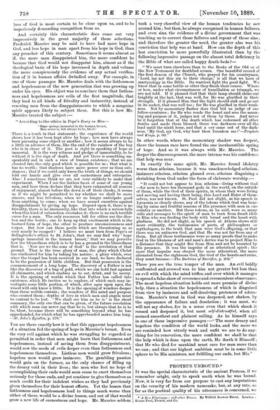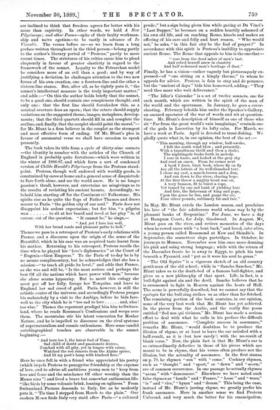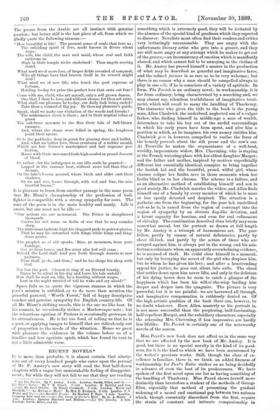FROTEUS UNBOUND.*
IT was the special characteristic of the ancient Proteus, if we remember aright, only to speak sooth when he was bound. Now, it is very far from our purpose to cast any imputations on the veracity of his modern namesake, but, at any rate, so far as the poetical quality of his utterances is concerned, we • 4 New Pilgrimage ; and other Poeme. By Wilfrid Scawen Blunt. London Kegati Paul, Trench, and Co.
are inclined to think that freedom agrees far better with his muse than captivity. In other words, we hold A New Pilgrimage; and other Poems—spite of their faulty workman- ship and naive egotism—to be vastly in advance of In Vineulis. The verses before us—so we learn from a long preface written throughout in the third person—belong partly to the author's literary period of "Proteus," partly to more recent times. The strictures of his critics cause him to plead eloquently in favour of greater elasticity in regard to the framework of the sonnet. Loyalty to the Petrarchan model he considers more of an evil than a good ; and by way of justifying a deviation, he challenges attention to the two new forms of his own creation, one a fourteen-line and the other a sixteen-line stanza. But, after all, as he rightly puts it, "the sonnet's intellectual measure is the truly important matter," and adds :—" On this the author holds briefly that the sonnet, to be a good one, should contain one conspicuous thought, and only one : that the first line should foreshadow this, as a musical overture does an opera ; that the octave should supply variations on the suggested theme, images, metaphors, develop- ments; that the third quartett should fill in and complete the outline, and, finally, that the couplet should point the moral,"— for Mr. Blunt is a firm believer in the couplet as the strongest and most effective form of ending. Of Mr. Blunt's plea in favour of assonantal verse we shall have occasion to speak presently.
The book takes its title from a cycle of thirty-nine sonnets —the identity in number with the articles of the Church of England is probably quite fortuitous—which were written in the winter of 1886-87, and which form a sort of condensed version of Childe Harold's Pilgrimage from the Protean stand- point. Proteus, though well endowed with worldly goods, is constrained by cares at home and a general sense of disquietude to fare forth alone, and see the world anew. He is no longer passion's thrall, however, and entertains no misgivings as to the results of revisiting his ancient haunts. Accordingly, we behold him starting off for the Continent via Folkestone. His spirits rise as he quits the fogs of Father Thames and draws nearer to Paris. "the golden city of our soul." Paris does not disappoint his ardent expectation ; but for him, "a pilgrim wan to it at her board and revel at her play" is, of course, out of the question. "It cannot be," he sings,— " And yet I love her well,
With her broad roads and pleasant paths to hell."
Thence we pass to a retrospect of Proteus's early relations with France, and a discourse upon the origin of the sense of the Beautiful, which in his case was an acquired taste learnt from his mother. Returning to his retrospect, Proteus recalls the
time when he played his "love's diplomacies " at the Court of "Eugenia—blest Empress." To the Paris of to-day he is by no means complimentary, but he acknowledges that she has a mission—" to teach all pride its level ;" and adds that France, as she was and will be, "Is the most serious and perhaps the best Of all the nations which have power with men," because she alone scorns hypocrisy. But to merit this eulogy she must put off her folly, forego her Tonquins, and leave to England her sad creed of gold. Paris, however, is still the artistic centre of the universe, and accordingly Proteus purges his melancholy by a visit to the Ambigu, before he bids fare- well to the city which he is "too sad to love and, alas !
too wise." Thence the repentant prodigal hies him to Switzer- land, where he reads Rousseau's Confessions and weeps over them. The mountains stir his latent veneration for Mother Nature, and he is impelled to discourse on the rival systems of supernaturalism and cosmic enthusiasm. Here some candid autobiographical touches are observable in the sonnet beginning :—
"And here too I, the latest fool of Time,
Sad child of doubt and passionate desires, Touched with all pity, yet in league with crime, Watched the red sunsets from the Alpine spires, And lit my poet's lamp with kindred fires."
Here be once fell in with a friend who appreciated his poetry (which impels Proteus to panegyrise friendship at the expense of love, and to advise all ambitious young men to "keep from love and fame and the mischance Of other worship than the Muses nine ") and lived a brave but somewhat antinomian life, "like birds by some volcanic brink, leaning on ugliness." From Switzerland Protein descends to Italy, for, as he modestly puts it, "'Tie time I stepped from Horeb to the plain." Our modern Moses finds Italy very staid after Paris—" a cultured prude;" but a sign being given him while gazing at Da Vinci's "Last Supper," he becomes on a sudden heartily ashamed of his own old life, and on reaching Rome, kneels and makes an offering of his care and folly and hurt reason. "Who would not," he asks, "in this fair city be the fool of prayer ?" In accordance with this spirit is Proteus's inability to appreciate ancient Rome. The Rome that appeals to him is the one that-
" rose from the dead ashes of men's lust, And robed herself anew in chastity And half redeemed man's heritage of dust."
Finally, he has a vision—rather vaguely but picturesquely ex- pressed—of "one sitting on a kingly throne," to whom he appeals for advice. Proteus is fain to stay and do penance. but the "ancient of days" bids him homeward, adding : "They need thee more who wait deliverance."
"The Idler's Calendar" is a set of twelve sonnets, one for each month, which are written in the spirit of the man of the world and the sportsman. In January, he goes a cover- shooting. February beholds him under the Speaker's Gallery, an amused spectator of the war of words and wit at question- time. Mr. Blunt's description of himself as one of those who sit "Far from the great world's vain imaginings," reminds one of the gods in Lucretius by its lofty calm. For March, we have a week at Paris. April is devoted to trout-fishing. We gladly quote what is, in our opinion, the beat of the set :—
" This morning, through my window, half-awake,
I felt the south wind blow ; and presently, With a tumultuous thrill and then a shake, The nightingale broke forth in melody.
I rose in haste, and looked at the grey sky And read an omen. From its corner next A book I drew, blest book, where fly on fly Are all the letters of its well-thumbed text. I chose my cast, a march-brown and a dun, And ran down to the river, chasing hope. At the first throw a mighty trout was on, A very Samson, fit to burst a rope, Yet tamed by one sad hank of yielding hair
And fate, the fisherman of king and pope, -Upon the grass he lies, and gasps the air, Four silver pounds, sublimely fat and fair."
In May, Mr. Blunt extols the London season, and proclaims his love of "the fair adulterous world whose way Is by the pleasant banks of Serpentine." For June, we have a day at Hampton Court; for July, Goodwood. In August, Mr. Blunt goes on the river, and revives memories of the days
when he rowed races with "a bent back," and loved, inter alias, a young person called Rosamond at Kew and Skindle's. In September, the sonnetteer slays partridges. In October, he journeys to Monaco. November sees him once more donning his pink and using strong language ; while with the return of the December frosts he is away to Egypt, to pitch his tent beneath a Pyramid, and "put as it were his soul to grass." "The Old Squire" is a vigorous sketch of an old country gentleman of the old school ; while in " Sancho Sanchez," Mr. Blunt takes us to the death-bed of a famous bull-fighter, and gives us a new philosophy of that sport. Life, in fact, is a bull-fight against sin and the devil. Sancho believes that he is summoned to fight in Heaven against the hosts of Hell. The scene is powerfully described, but we cannot say that the apologia for the bull-ring strikes us as other than far-fetched. The remaining portion of the book contains, in our opinion, some of the very best work that Mr. Blunt has yet achieved. In the pieces from the Arabic, and the really fine poem entitled "Sed nos qui vivimus," Mr. Blunt has made a serious effort to deal with what he calls in his preface the difficult problem of assonance. "Complete success in assonance," remarks Mr. Blunt, "would doubtless be to produce the illusion of rhyme, or at least to leave the ear satisfied with a half-result, as it is (but how rarely !) with the no-result of blank verse." Now, the plain fact is that Mr. Blunt's ear is so extraordinarily defective in those of his pieces which are meant to be in rhyme, that his verses often produce not the illusion, but the actuality of assonance. In the first stanza on p. 79, he rhymes " sun " with "come." Cockney rhymes, such as " thought " and "sport," or " dawn " and "scorn," are of common occurrence. In one passage he actually rhymes " arena " with "demeanour." Elsewhere we have noted such false rhymes as " hands " and "France," " loose" and "woes," " is " and "vice," " hymn " and "dream." This being the case, instead of Mr. Blunt's jarring rhyme, we greatly prefer his frank assonance. Here in another sense we find Proteus Unbound, and very much the better for his emancipation. The poems from the Arabic are all instinct with genuine passion ; but better still is the last piece of all, from which we gladly quote the following stanzas :—
"How beautiful is life ! The present sense of souls that love us ; The enfolding spirit of love, made known in divers silent ways ;
The wife, the child, the man and maid, whose zeal and faith enthrone us High in their temple niche enshrined ! Thus angels serving stand.
What need we of more love, of larger fields revealed of conquest, Who all things have that heaven itself in its reward might deal ?
What need we of new life, who touch the goal supreme of fortune, Holding to-day for prize the perfect love that casts out fear ?
Come with me, child, who art myself, only a self grown dearer, One that I dare to love, and without shame, for thou art mine. What shall our pleasure be to-day, our daily task being ended ?
Take thou a counsel of thy joy. Be thou my pleasure's guide.
Speak, shall we make our visitation of the woods and forests ? The midsunoner shoot is there ; and in their nuptial robes of green The oak-trees murmur to the flies their tale of full-blown summer, And, where the stems were felled in spring, the foxgloves point their spears.
Or to the paddocks, deep in green for grazing steer and heifer. And, what we better love, those creatures of a nobler mould, Which are fair Nature's masterpiece and last supreme per- fection, Mares with their unweaned foals high-souled in proud descent of blood.
Or rather—let the indulgence to our idle souls be granted— Lapped in the summer heat, without more toil than this of dreams, On the lake's bosom moored, where birch and alder cast their shadows, Sit we and woo, hours through, with rod and line, the mis- trustful bream."
It is pleasant to learn from another passage in the same poem that Mr. Blunt's championship of the profession of bull- fighter is compatible with a strong sympathy for cows. The tone of the poem is in the main healthy and manly. Life is sweet, but one must not be idle :— " Our actions are our monument. The Prince in slaughtered thousands
Carves his red name on fields of war that he may sounder sleep.
The statesman fashions high his sluggard pride to patriot glories, That he may lie entombed with kings while kings and king- doms grieve.
The prophet as of old speaks, 'Rise, ye mourners, from your bondage, Get ye from hence, and flee away afar lest evil come ; Behold, the Lord shall lead you forth through deserts to new pastures, Thus shall ye do, and thus;' and he too sleeps his sleep with God.
Nor less the poet. Chosen to sing of an Eternal beauty, Dares he be silent in his day and leave his tale untold ? How shall he wait on, idly, he a hireling without wages, Lest in the night untried of toil he wake and cry aloud?"
Space fails us to quote the vigorous stanzas in which the poet's mission is unfolded, or to do more than mention the graceful pastoral, "Worth Forest," full of happy descriptive touches and genuine sympathy for English country-life. Of all Mr. Blunt's shifting moods, this is the one we like best. In his sonnets, he occasionally strikes a Marlowesque note ; but the robustious egotism of Proteus is occasionally grotesque in its obtrusiveness. He is far too fond of telling us that he is a poet, or applying images to himself that are ridiculously out of proportion to the needs of the situation. Hence we greet with pleasure the evidences in the volume before us of a kindlier and less egotistic spirit, which has found its vent in not a little admirable verse.








































 Previous page
Previous page